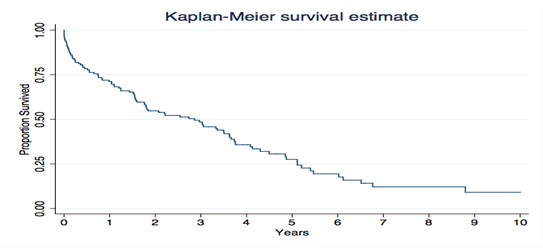INDICATIONS AND SURVIVAL OF 90 YEAR OLDS UNDERGOING CORONARY ANGIOGRAPHY
Mandeep S. Sidhu, M.D., Albany Medical College, Albany, New York, USA
Background: The Elderly are the fastest growing segment of western population. 1 in 5 US Citizen will be elderly by the year 2030. Nonagenarians (>90 year old) are projected to grow to 18 million by the year 2050. Cardiovascular disease (CVD) is the leading cause of morbidity, mortality and reduced quality of life in this group. Despite higher incidence of CVD, scientific evidence is not as good regarding interventional treatment of the nonagenarians.
Methods: Medical history and clinical presentation were prospectively collected on 147 consecutive patients =90 years old at our institution; a tertiary care referral center, between 1995 and 2011. End point was time to death after coronary angiography. Kaplan-Meier survival statistics were conducted. Survival was obtained by linkage to the Social Security Death Administration Death Master File.
Results: Mean age was 92 (90-97) years. 61% were female. 15% had EF < 30%, 36% procedures were performed emergently, 47% were urgent and 17 % were elective, 8% had a previous CVA. ST elevation MI (STEMI) was the most common indication for coronary angiography followed by Non-STEMI. Figure 1. Median survival after coronary angiography was 2.8(0.7- 5.1) years. There were 28.2 deaths per 100 person years of follow-up. Figure 2.
Conclusions: In this study majority of nonagenarians undergoing coronary angiography were for emergent or urgent indications.. When performed in carefully selected patients coronary angiography may help reduce morbidity and mortality. Further study is needed in this rapidly growing segment of the population to evaluate the utilization and impact of interventional treatments.

|